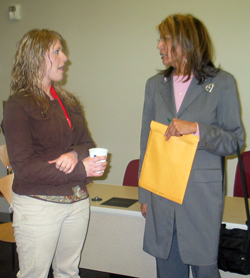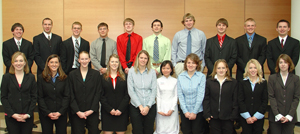 |
Carole Anne Heart, right, talks with Jerilyn Barta, a student at Nebraska Wesleyan University, after Heart’s presentation on cultural competency. |
For more than an hour, Carole Anne Heart weaved stories from her life into the facts and figures she presented about American Indians to the 20 undergraduate students visiting UNMC earlier this month.
“There are still quite a few people who live on the reservations who don’t have indoor plumbing. Growing up we had a hand pump for water but at least it was inside,” said the executive director of the Aberdeen Area Tribal Chairmen’s Health Board and member of the Rosebud Sioux Tribe of South Dakota
Heart’s presentation was part of a weeklong cultural competency workshop for undergraduate pre-health profession students. The program is sponsored with funding from the Rural Health Education Network and Area Health Education Center Offices at UNMC.
Heart spoke to the students about the historical, cultural and contemporary issues facing American Indians.
“American Indians have the highest rates of alcoholism, diabetes, heart disease, suicide and death due to unintentional injuries,” Heart said.
As executive director of the AATCHB, Heart works with leaders and representatives from 18 tribes spread across North Dakota, South Dakota, Nebraska and Iowa to improve the health and well-being of the American Indians she serves.
The mission of the AATCHB is to provide a voice for the people of these northern plains tribes, assist the federal Indian Health Service in establishing program priorities and distributing existing resources and to provide guidance to member tribes in the development of health programs that will be beneficial to them, Heart said.
 |
A group shot of the 20 undergraduate students who came to UNMC recently to take part in a cultural competency workshop. Pictured from the left in the back row are Ethan Stout, Devin Bethune, Scott Hackman, Jonathan Jacobsen, Chase Tellus, Alex Renshaw, Tyler Moos, Chad Vogeler, Aaron Persinger and Benjamin Noll. From left in the front row are Amy Uher, Megan Saathoff, Sarah Milne, Jerilyn Barta, Jamie Parman, Trang Pham, Megan Kuchta, Shakeeta Svitak, Alexa Whitefoot and Amanda Kuhr. |
“More than 400 million acres of land was ceded to the U.S. by Indian tribes in exchange for health care and education,” Heart said. “That is why we have the Indian Health Service today, but less money is spent on providing for this treaty obligation than is spent on prisoners.”
Heart also touched on cultural differences a health professional might encounter.
“It’s impolite to stare at a person, just as it is impolite to look a person directly in his or her eyes,” she said.
Ultimately though, it is in how the provider interacts with the patient that will determine whether or not a person will listen to their doctor.
“People can tell if you are being sincere with them,” she said.
Here some comments from the undergraduate students who took part in the cultural competency workshop.
Jerilyn Barta: My experience at this workshop has been amazing. I have learned so much in the course of one week. I know that the information I have learned will help me in my future career. I look forward to sharing my experiences with others.
Scott Hackman: This workshop is exactly the type of experience that a student interested in a health profession needs to undertake. Coming from a rural setting, I have had little exposure to the underserved populations of Nebraska. In my shadowing experience, I was able to experience medicine in an environment like no other. The amount of information I have learned about other cultures is amazing and I will carry this knowledge with me for the rest of my life.
Jonathan Jacobsen: Cultural competency is imperative in dealing with people from a different culture, particularly in healthcare. Empathy is the key to dealing with other cultures and is inhibited by ignorance and lack of understanding. This workshop presented an excellent opportunity to learn about many cultures we may deal with. This newfound awareness helped explain some past encounters and will be very helpful in understanding future encounters. My experiences at this workshop have inspired a good deal of inflection about disparities in our nation and state. Learning about these cultures was enjoyable and ignited an unknown curiosity. I feel a life-long process of learning was enhanced by attending this workshop.
Amanda Kuhr: I thought I had a good idea of what it meant to be culturally competent before I came to this workshop, but after completing the class, I realize how much I really did not know. I learned a great deal, like that no two people are alike and that we should accept these differences instead of trying to ignore them. I also enjoyed learning about quite a few different cultures. But most importantly, I learned that what you ask a person is not nearly as important as “how” you ask it. One should use a person’s differences as an opportunity to lean more about how the world looks through someone else’s eyes.